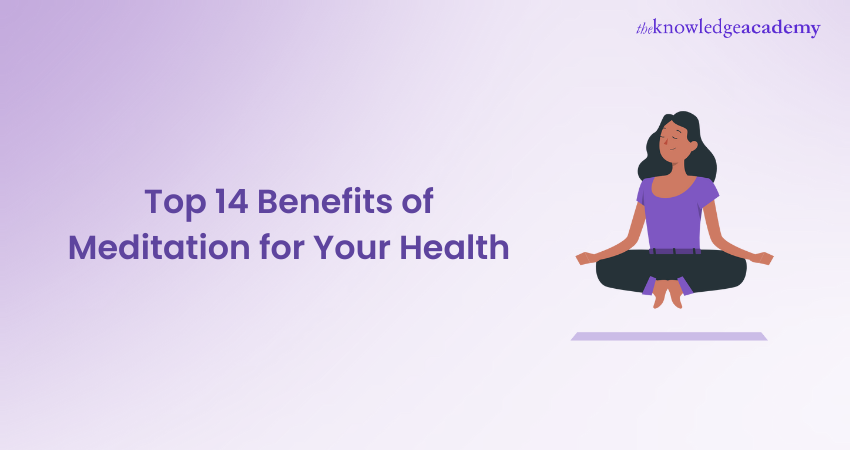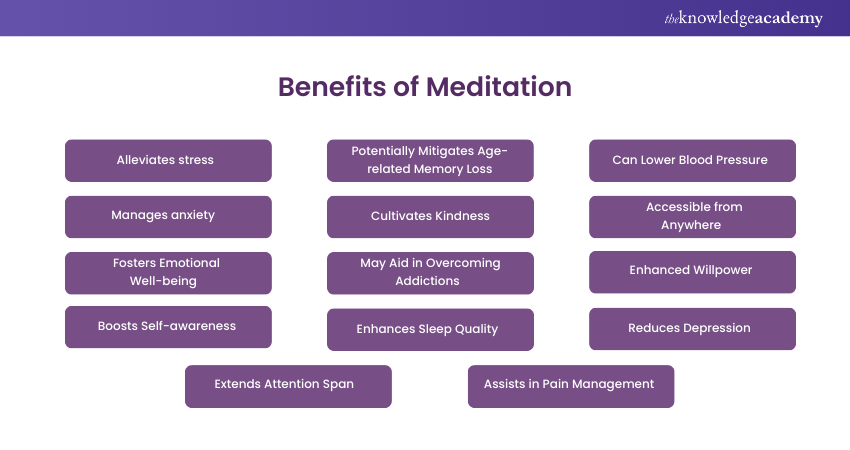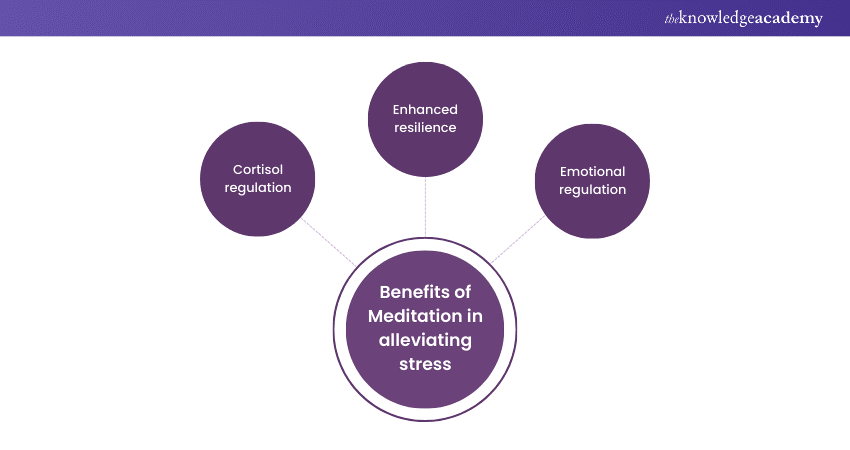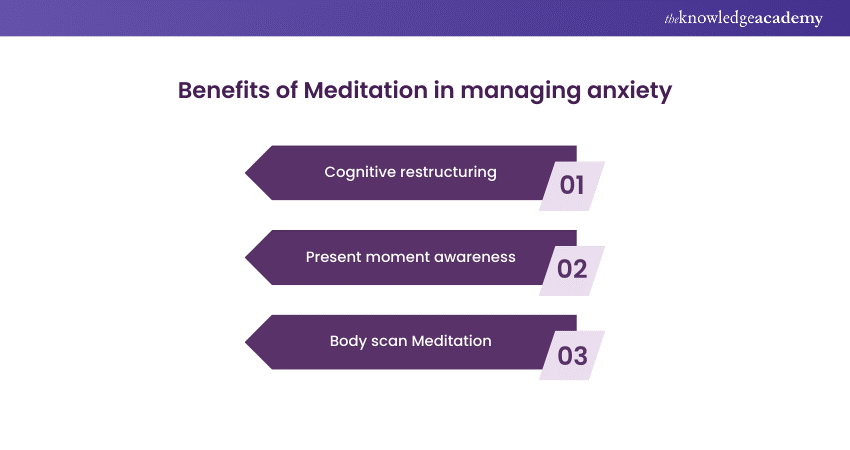We may not have the course you’re looking for. If you enquire or give us a call on 800600725 and speak to our training experts, we may still be able to help with your training requirements.
Training Outcomes Within Your Budget!
We ensure quality, budget-alignment, and timely delivery by our expert instructors.

Meditation has demonstrated numerous advantages. While renowned for its efficiency in stress and anxiety reduction, research indicates its potential to elevate mood, foster sound sleep, and enhance cognitive abilities. Meditation constitutes a routine practice aimed at refining concentration and directing thoughts.
The prevalence of Meditation is on the rise as an increasing number of individuals recognise its various health benefits. For many, it functions not only as a stress-reducing method but also as a tool for improving concentration. Our blog is your guide to understanding the transformative Benefits of Meditation that can positively impact your mind, body, and soul. Read more to learn more!
Table of Contents
1) Life-transforming Benefits of Meditation
a) Alleviates stress
b) Manages anxiety
c) Fosters emotional well-being
d) Boosts self-awareness
e) Extends attention span
f) Potentially mitigates age-related memory loss
g) Cultivates kindness
h) May aid in overcoming addictions
i) Enhances sleep quality
j) Assists in pain management
k) Can lower blood pressure
l) Accessible from anywhere
2) Conclusion
Life-transforming Benefits of Meditation
The following are the Benefits of Meditation:

1) Alleviates stress
Meditation fosters a deep mind-body connection, activating the relaxation response of your brain and reducing the physiological effects of stress. Techniques like guided imagery, progressive muscle relaxation among others are integral to stress reduction. Meditation helps alleviate stress in the following ways:

1) Cortisol regulation: Chronic stress often leads to elevated cortisol levels, impacting overall health. Meditation has been shown to help regulate cortisol production, mitigating the harmful effects of prolonged stress on the body's systems.
2) Enhanced resilience: Regular Meditation builds resilience by altering how individuals perceive and respond to stressors. The practice encourages a mindful and non-reactive approach, enabling individuals to navigate challenges more easily.
3) Emotional regulation: Stress often manifests as emotional turmoil. Meditation cultivates emotional regulation by creating a space for individuals to observe and acknowledge emotions without being overwhelmed, fostering a sense of emotional balance.
2) Manages anxiety
Meditation techniques, especially focused on mindful breathing, provide individuals with a tangible tool to manage anxiety. Deep, intentional breaths can help activate the parasympathetic nervous system, inducing a calming effect. Meditation helps manage anxiety in the following way:

1) Cognitive restructuring: Anxiety is often fueled by distorted thinking patterns. Meditation encourages cognitive restructuring, allowing individuals to challenge and reframe anxious thoughts, promoting a more balanced and realistic perspective.
2) Present moment awareness: Anxiety often arises from anticipation of future events. Meditation's emphasis on present-moment awareness helps individuals break free from their cycle of anxious thoughts, fostering a sense of control over the mind.
3) Body scan Meditation: Incorporating practices like body scan Meditation enables individuals to identify and release tension held in the body, providing both a physical and mental release from anxiety.
3) Fosters emotional well-being
Meditation involves feelings of love and compassion towards oneself and others. Regular loving-kindness Meditation enhances emotional intelligence, promoting empathy and positive interpersonal relationships. Meditation fosters emotional well-being in the following way:
1) Acceptance of emotions: Meditation encourages a non-judgmental acceptance of positive or negative emotions. This acceptance allows individuals to process and understand their emotions, reducing the impact of emotional turbulence.
2) Mindful journaling: Combining Meditation with mindful journaling provides an avenue for emotional expression. Writing about emotions and experiences deepens self-awareness and facilitates emotional healing.
3) Improved stress coping mechanisms: As emotional intelligence grows; individuals develop healthier coping mechanisms for dealing with stressors. Meditation equips individuals with the tools they need to respond to challenges with equanimity and compassion.
4) Boosts self-awareness
A cornerstone of Meditation is observing thoughts without judgment. This process allows individuals to become more attuned to their habitual thought patterns and reactions, fostering self-awareness. Meditation boosts self-awareness in the following way:
1) Exploration of core values: Meditation often leads to a deeper exploration of one's core values and beliefs. This self-discovery can prompt individuals to align their actions with their authentic selves, enhancing a sense of purpose and fulfilment.
2) Mindful decision-making: Increased self-awareness translates into mindful decision-making. Individuals who practice Meditation are more likely to make choices aligned with their values, contributing to a more meaningful and intentional life.
3) Breaking habits: Through sustained mindfulness practices, individuals can identify and break free from detrimental habits or thought patterns hindering personal growth.
Take the first step towards better health! Join our Healthy Lifestyles Training and learn how to make positive lifestyle changes.
5) Extends attention span
Techniques like mindfulness Meditation focus on a specific point, such as the breath or a mantra. This sustained focus cultivates attentional control and improves the ability to concentrate. Meditation extends attention span in the following way:
1) Neuroplasticity: Regular Meditation has been associated with changes in the brain's structure, particularly in areas related to attention and concentration. This phenomenon, known as neuroplasticity, suggests that the brain can adapt and strengthen through Meditation.
2) Reduced multitasking: In a world of distractions, Meditation encourages individuals to embrace single-tasking. By training the mind to focus on one thing at a time, individuals can improve their ability to concentrate and avoid the pitfalls of multitasking.
3) Enhanced cognitive performance: The Benefits of an extended attention span extend beyond Meditation sessions. Individuals who cultivate focused attention through Meditation often report improved cognitive performance in various aspects of their lives.
6) Potentially mitigates age-related memory loss
Some studies suggest that Meditation may stimulate neurogenesis. Neurogenic are the formation of new neurons in the brain. This process is crucial for maintaining your cognitive functions and potentially offsetting age-related memory decline. Meditation mitigates age-related memory loss in the following ways:
1) Improved hippocampal activity: The hippocampus, a brain region associated with memory, tends to decline with age. Meditation has been linked to increase the activity in the hippocampus, suggesting a protective effect on memory function.
2) Mindful ageing: Meditation promotes a mindful approach to ageing, encouraging individuals to engage with the present moment rather than dwelling on concerns about memory loss. This positive mindset can contribute to overall cognitive well-being.
3) Long-term cognitive resilience: While research on the long-term effects is ongoing, preliminary findings indicate that regular Meditation may confer cognitive resilience, potentially reducing the severity of age-related cognitive decline.
Discover a path to wellness with our Healthy Lifestyles Training – embrace a vibrant and balanced life today!
7) Cultivates kindness
This practice involves sending positive intentions and well-wishes to oneself and others. Regular engagement in loving-kindness Meditation fosters a deep sense of compassion, promoting kindness in thoughts and actions. Meditation cultivates kindness in the following way:
1) Empathy development: Meditation contributes to the development of empathy by encouraging individuals to adopt a perspective of interconnectedness. This shift in perspective allows for a more compassionate understanding of the experiences of others.
2) Altruistic behaviours: Studies indicate that individuals who regularly practice loving-kindness Meditation are likelier to engage in altruistic behaviours. The cultivation of kindness extends beyond Meditation sessions, positively impacting relationships and social interactions.
3) Reduced hostility: Meditation has been associated with reduced feelings of hostility and increased prosocial behaviours. This shift towards kindness contributes to a more positive and harmonious social environment.
8) May aid in overcoming addictions
Meditation, particularly mindfulness-based interventions, is increasingly integrated into treatment programs. Mindfulness can help you develop a heightened awareness of cravings and triggers, empowering them to make healthier choices. Meditation aids in overcoming addictions in the following ways:
1) Reduced impulsivity: Addiction often involves impulsive behaviours. Meditation has been shown to reduce impulsivity by promoting a pause between stimulus and response, giving individuals the space to make more deliberate and informed decisions.
2) Emotional regulation in recovery: Meditation supports emotional regulation, a crucial aspect of addiction recovery. Individuals learn to sit with and observe difficult emotions without resorting to substance use as a coping mechanism.
3) Building resilience: Addiction recovery is a journey fraught with challenges. Meditation equips you with the tools to build resilience, bounce back from setbacks, and cultivate a positive mindset that supports long-term recovery.
9) Enhances sleep quality
Meditation triggers the relaxation response, promoting a physiological state conducive to sleep. Practicing techniques like progressive muscle relaxation and guided imagery effectively induce a sense of calm before bedtime. Meditation enhances sleep quality in the following ways:
1) Mindful evening routine: Incorporating Meditation into an evening routine signals to the body that it's time to wind down. This mindful transition prepares individuals for restful sleep by reducing the impact of racing thoughts and stress.
2) Reduction in insomnia symptoms: Studies suggest that mindfulness Meditation can lead to a significantly reduce the insomnia symptoms. By addressing the mental as well as the physical components of sleep disturbances, Meditation offers a holistic approach to improving sleep quality.
3) Quality over quantity: While sleep duration is crucial, Meditation focuses on sleep quality. Individuals who practice Meditation often report longer sleep durations and a subjective improvement in the depth and restfulness of their sleep.
Discover the power to shape a healthy and vibrant life with our Active and Healthy Lifestyles Training – transform your well-being today!
10) Assists in pain management
Chronic pain is often a result of stress and tension. Meditation, emphasising the mind-body connection, allows individuals to observe and release physical tension, relieving pain symptoms. Meditation assists in pain management in the following way:
1) Changing pain perception: Individuals can change their perception of pain through mindfulness practices. By approaching pain with acceptance and non-resistance, individuals often report a reduction in the subjective intensity of pain.
2) Enhanced pain coping strategies: Meditation equips individuals with a toolkit of pain coping strategies. Rather than relying solely on medication, individuals can leverage Meditation to complement their pain management plan, fostering a sense of control over their well-being.
3) Mindful movement practices: Integrating mindfulness into movement practices, like yoga or tai chi, enhances flexibility and reduces muscle tension. These practices, when combined with Meditation, offer a comprehensive approach to pain management.
11) Can lower blood pressure
The relaxation response induced by Meditation directly impacts blood pressure. As the body enters a state of deep relaxation, blood vessels dilate, lowering blood pressure levels. Meditation helps lower blood pressure in the following ways:
1) Stress reduction and hypertension: Chronic stress is a significant contributor to hypertension. Meditation's ability to reduce stress has a cascading effect on blood pressure, potentially lowering the risk of hypertension and its associated health risks.
2) Long-term cardiovascular Benefits: Individuals who practice Meditation over the long term may experience sustained cardiovascular Benefits. This includes lower blood pressure and improvements in overall heart health.
3) Mindfulness and heart-healthy habits: Meditation encourages mindfulness in lifestyle choices, including dietary habits and exercise. This holistic approach to cardiovascular health complements traditional medical interventions.
12) Accessible from Anywhere
Meditation requires minimal resources, unlike many wellness practices that necessitate specific environments or equipment. A quiet space and a comfortable seat are often sufficient, making it a highly accessible practice. Various Types of Meditation cater to different preferences and schedules.
Whether a brief mindfulness session during a break or a more extended guided Meditation at home, the versatility of practices ensures accessibility from virtually anywhere. The flexibility of Meditation allows individuals to integrate it into their daily routines seamlessly.
13) Enhanced Willpower
Meditation helps develop self-discipline as they are practices, that are specifically designed to help you be more mindful. This includes being more mindful about choices, managing stressful situations well and controlling cravings.
Constantly practising Meditation techniques helps build willpower and avoid unnecessary consumption of guilty pleasures.
14) Reduces Depression
If you suffer from depressive episodes and are looking for a way to manage them, you should consider Meditation. It is a great method to manage your negative thought processes that may lead to depressive spirals.
Another way Meditation helps reduce depression is that it helps you accept your surroundings for what it is. Often, depression is caused by unrealistic expectations from the world around us. Managing expectations and accepting reality lets us have a better outlook on life.
Start sculpting your path to a healthier you with Nutrition And Fitness Training – join now!
Conclusion
Meditation stands as a universally accessible practice for improving mental and emotional well-being. The diverse array of Meditation styles caters to individual preferences, each offering unique strengths and Benefits. Exploring and adopting a Meditation style aligned with personal goals presents an effective means to enhance one's quality of life, even with just a few minutes dedicated to practice each day. We hope you have understood the various Benefits of Meditation through this blog!
Learn Meditation techniques to effectively manage and reduce stress with our Meditation Course!
Frequently Asked Questions

Meditation promotes a sense of peace, calm, and balance, which positively affects overall well-being. Regular Meditation practice helps individuals manage daily stressors effectively and fosters a greater sense of inner peace and happiness.

Yes, Meditation fosters creativity by clearing the mind and enhancing cognitive flexibility. It encourages a state of relaxed awareness, which can lead to the free flow of ideas and innovative thinking.

The Knowledge Academy takes global learning to new heights, offering over 30,000 online courses across 490+ locations in 220 countries. This expansive reach ensures accessibility and convenience for learners worldwide.
Alongside our diverse Online Course Catalogue, encompassing 17 major categories, we go the extra mile by providing a plethora of free educational Online Resources like News updates, blogs, videos, webinars, and interview questions. Tailoring learning experiences further, professionals can maximise value with customisable Course Bundles of TKA.

The Knowledge Academy’s Knowledge Pass, a prepaid voucher, adds another layer of flexibility, allowing course bookings over a 12-month period. Join us on a journey where education knows no bounds.

The Knowledge Academy offers various Healthy Lifestyles Training, including Active Healthy Lifestyle Training, Cognitive Behavioural Therapy Training, Yoga Training, and Nutrition Courses. These courses cater to different skill levels, providing comprehensive insights into Mindfulness.
Our Health & Safety Blogs cover a range of topics related to Psychology and Mental Health, offering valuable resources, best practices, and industry insights. Whether you are a beginner or looking to advance your Health and Safety knowledge, The Knowledge Academy's diverse courses and informative blogs have you covered.
Upcoming Health & Safety Resources Batches & Dates
Date
 Life Coach Training
Life Coach Training
Fri 14th Feb 2025
Fri 11th Apr 2025
Fri 13th Jun 2025
Fri 15th Aug 2025
Fri 10th Oct 2025
Fri 12th Dec 2025







 Top Rated Course
Top Rated Course



 If you wish to make any changes to your course, please
If you wish to make any changes to your course, please


